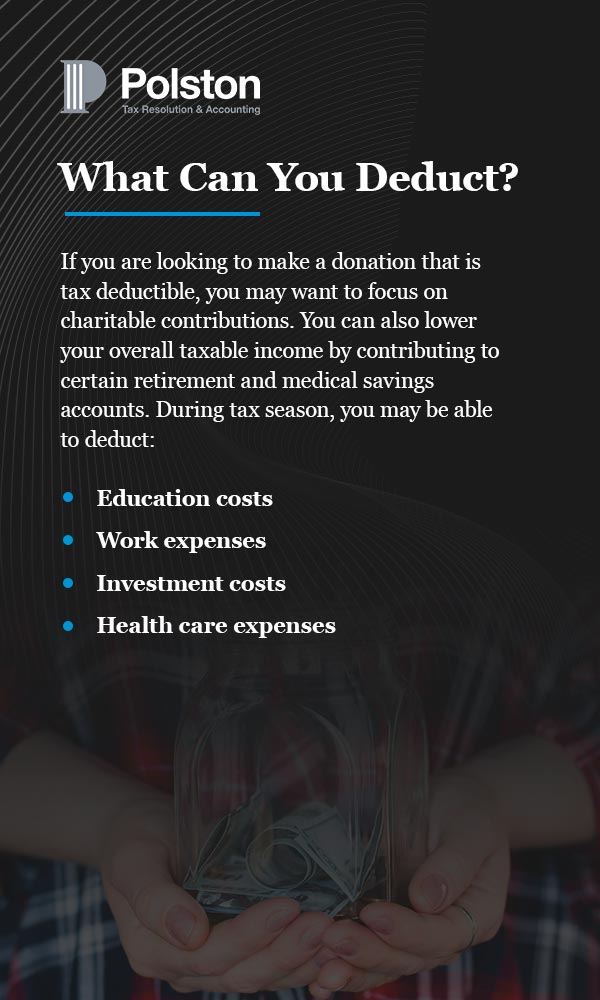
100+ Years of Combined Tax Resolution Experience.
100+ Years of Combined Tax Resolution Experience.
During election season, advertisements and news about political candidates and the election are everywhere. You’ve likely also been receiving requests for donations to political campaigns. If you are planning to make a donation to a political party, you may be wondering if you can claim this contribution as a deduction on your tax return.
Below, we cover whether political contributions are tax deductible, the difference between political contributions and charitable donations and whether you can deduct your expenses if you volunteer for a political campaign. Learn what happens if you choose to donate money to the presidential election campaign and whether in-kind contributions are tax deductible.
Table of Contents
Are Political Contributions Tax Deductible?
Both business and individual donations to political parties are not tax deductible. While American taxpayers may choose to donate to political organizations and campaigns to influence the political landscape, these contributions cannot be deducted on tax returns. The following are examples of political donations that are not considered tax deductible:
- Donations to political parties
- Donations to newsletter funds
- Donations to a political candidate
- Donations to a campaign committee
- Donations to political action committees (PACs)
Some taxpayers may initially believe that political contributions may be tax deductible because charitable donations can usually be deducted on tax returns. However, there are differences between political contributions and charitable donations that impact what you can deduct on your taxes. Deductible charitable donations are usually those that are made to tax-exempt organizations under the Internal Revenue Code’s §501(c)(3). These organizations are prohibited from participating in a political campaign or attempting to influence legislation.
What Is the Difference Between Political Contributions and Charitable Donations?
Unlike political contributions, charitable donations are typically tax deductible. To deduct these donations on your return, you are usually required to itemize your deductions. The amount that you can claim for qualified cash contributions depends on your tax filing status. Examples of charitable donations that you may be able to deduct include:
- Qualified nonprofit hospitals and schools
- Contributions for a public purpose to local, state or federal governments
- Qualified nonprofit organizations like United Way and the American Red Cross
- Donations to qualified religious organizations, such as churches, synagogues, temples and mosques
Along with donations to political candidates or groups running for public office, examples of contributions you cannot deduct include those made to groups with the purpose of lobbying for law changes, groups run for personal profit, civic leagues, labor unions or country clubs.
When you claim a charitable donation as a tax deduction, you will typically list this deduction on Schedule A (Form 1040). This is the form on which you can claim your itemized deductions. The IRS includes a list of qualifying organizations via a Tax Exempt Organization Search tool. If you need further assistance with determining whether the organization you want to donate to qualifies as tax deductible, a tax professional can help.
Can I Deduct My Expenses if I Volunteer for a Political Campaign?
If you choose to volunteer for a political campaign or organization, you may spend money on out-of-pocket expenses, such as supplies and transportation. These costs are also not considered tax deductible by the IRS, along with the time you spend volunteering. If you spend your time and money volunteering for a group seeking to influence legislation, such as political candidates, political campaigns and PACs, you cannot claim this as a tax-deductible expense on your return.
The only out-of-pocket expenses you can deduct are those you incur from volunteering with a qualified nonprofit charitable organization, such as unreimbursed mileage. Keep in mind, however, that you cannot deduct the value of the hours you spend volunteering nor the value of services you provided. Essentially, you cannot deduct an hourly rate on your taxes for the time you spent volunteering, even for a qualified organization. Reach out to a tax attorney if you need further guidance on what expenses may be considered tax deductible.
What if I Elect to Give $3 to the Presidential Election Campaign?
On Form 1040, you will be asked whether you want to donate to the presidential election campaign fund. By checking this box, you are agreeing to give $3 to presidential candidates. This money will not be taken out of your refund. Instead, $3 from your income taxes is allocated to the fund. Your deductions and taxes will also not be affected.
Are In-Kind Contributions Tax Deductible?
In-kind contributions are any contributions that are not money, such as time, services or tangible goods. No matter whether you make a political contribution in-kind or with cash, it is not considered tax deductible. When you make an in-kind donation to qualified charities, however, this can be deductible if it meets certain requirements. A tax professional can determine whether your in-kind contributions to charities are tax deductible.
What Can You Deduct?
If you are looking to make a donation that is tax deductible, you may want to focus on charitable contributions. You can also lower your overall taxable income by contributing to certain retirement and medical savings accounts. During tax season, you may be able to deduct:
- Education costs: When you are paying student loans, you may be able to deduct interest you pay on your loans. If you have work-related educational costs, you can deduct these expenses as well.
- Work expenses: You may be able to deduct some of your work-related expenses, such as the costs of a home office and necessary equipment.
- Investment costs: Capital losses and part of your deficits when you lose money or sell an investment may be deductible.
- Health care expenses: Additionally, you may be able to deduct contributions to a health savings account (HSA), along with dental and medical expenses.
You may also be able to take itemized deductions for costs like mortgage interest and property tax. These deductions can help you save on your taxes, even if you can’t deduct a political donation.
Schedule a Free Consultation With Polston Tax
At Polston Tax, we can help resolve tax balances, prepare your tax returns and navigate state or IRS audits. If you are a business owner, we can help you solve tax issues and assist with your business accounting needs.
After you request our tax resolution services, we will complete a financial analysis, which involves contacting the state or the IRS and developing an analysis of what you owe and for which years you owe. We will request a collection hold so you will be protected from collection action while we collect information and create a game plan for tax resolution.
We analyze this information to determine the best course of action for your unique financial situation. Once we come to an agreement on next steps, we can begin negotiations with the state or IRS on your behalf. Contact us at Polston Tax to schedule a free consultation to discuss whether your donations are tax deductible.
Additional Readings

We’re in an era in which more small businesses are launching like wildfire. Many people find starting a small business of their own as easy as a piece of cake. However, most of the time, what they fail to prioritize are some of the major players involved in smoothly operating their small business. A...

Do you know why most married taxpayers go for filing joint tax returns? It’s actually because of the benefits that it offers. But with joint tax returns, both the filers hold the responsibility for the tax bill or any penalties and interest that arise from it. Both are legally responsible for the entire liability, even...

What if you owe so much in taxes that you can’t see your way out of it? If you owe back taxes, you might not think there is a way you can ever pay things off. And the more those back taxes have accumulated, the deeper the hole. But that doesn’t mean you can’t dig...

Tax Audits are one of the most terrifying things a taxpayer can endure. Most taxpayers don’t know what being audited by the IRS entails and usually don’t know what to do if they are audited. IRS audits can be confusing to most taxpayers as most don’t know what the IRS is looking for when they...

Receiving a letter from the IRS can be intimidating, especially if you’re unsure what the notice is for or what to do next. Fortunately, many notices are nothing to worry about and are purely informative. Below, we look at everything you need to do — and what not to do — after getting a notice from the...

The Internal Revenue Service (IRS) is increasing audits on cannabis businesses — the agency is on a mission to ensure that cannabis businesses adhere to the tax code. Unfortunately, cannabis companies must comply with more strict tax laws than other businesses and can claim fewer deductions. Most business owners don’t realize this or aren’t able to meet the reporting responsibilities on their own. If you own a business in...




